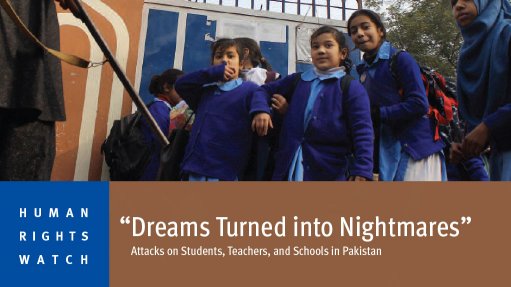
On December 16, 2014, six days after Malala Yousafzai received the Nobel Peace Prize, armed militants attacked the Army Public School in Pakistan’s Peshawar city, killing 145 people, almost all of them children. Gunmen systematically went from classroom to classroom, shooting children and teachers at the military-run school. Tehreek-i-Taliban Pakistan (TTP), the so-called Pakistani Taliban, claimed responsibility for the attack as revenge for a Pakistan Army offensive in the tribal areas of North Waziristan that began in June 2014. It remains among the deadliest attacks ever on a school in any country.
Pakistan already faces major challenges to education because of factors such as poor access, low enrollment rates, gender bias, lack of trained teachers, and poor physical infrastructure. Islamist militant violence has further exacerbated those challenges, however, and disrupted the education of hundreds of thousands of children.
Human Rights Watch defines “attacks on education” as encompassing the full range of violations that place children at risk and deny them access to education. This includes attacks on school infrastructure and on students, teachers, and school administrators; the occupation of schools by the police and military; and harassment and threats against teachers, parents, and education professionals.
Militant groups have damaged and destroyed school buildings, attacked teachers and students, and terrorised parents into keeping their children out of school. They have also targeted colleges and other higher-education institutions. Such attacks and threats of attack on education not only harm the students and families directly affected, they have an incalculable long-term effect on Pakistani society.
In addition, in some areas, government security forces have used educational institutions, including schools and college hostels or dormitories, as temporary or permanent barracks or military bases. When an educational facility is used for military purposes, it disrupts the school’s functioning, places it at increased risk of attack, and often frightens parents into keeping their children—especially girls—at home. Criminal gangs, often operating with political patronage, have also occupied schools.
Pakistan’s militant Islamist groups use attacks on schools and universities to foster intolerance and exclusion, to target symbols of the government, and particularly to enforce gender discrimination, notably by preventing the education of girls. The challenge to educating girls in Pakistan drew international attention in 2012, when the Taliban shot a young student, Malala Yousafzai, for publicly defending her right to education. She survived the attack and continued her campaign, becoming the youngest individual—and the first and only child—to receive the Nobel Peace Prize in 2014.
This report, based on interviews with 48 people—including students, teachers, parents, and school administrators in the provinces of Punjab, Sindh, and Khyber Pakhtunkhwa (KP)—documents attacks on schools, students, and teachers between 2007 and late 2016. In a 2010 report, Human Rights Watch documented the killing of at least 22 teachers and education professionals by nationalist militants in Balochistan province between 2008 and 2010.
Report by the Human Rights Watch